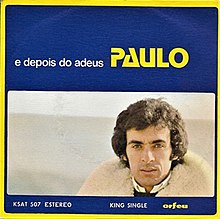music.wikisort.org - Composition
"E depois do adeus" ("And After the Farewell") is a song recorded by Portuguese singer Paulo de Carvalho, written by José Calvário and José Niza. It is best known as the Portuguese entry at the Eurovision Song Contest 1974, held in Brighton, after winning Festival da Canção 1974.
The song's airing on 24 April 1974 at 10:55 p.m. on Emissores Associados de Lisboa Radio Station, was one of the two secret signals which alerted the rebel captains and soldiers to begin the Carnation Revolution.
Description
The song is a ballad, with Paulo de Carvalho taking the role of a man who is faced with the end of a relationship. He tells his lover how he feels, likening her to "a flower that I picked", implying that the relationship was of a comparatively short duration. He also comments on the nature of love itself, singing that it is "winning and losing".
The song was performed sixteenth on the night, following Switzerland's Piera Martell with "Mein Ruf nach dir" and preceding Italy's Gigliola Cinquetti with "Sì". At the close of voting, it had received 3 points, placing 14th (and tying for last with Switzerland, Norway and Germany) in a field of 17.[1]
It was succeeded as Portuguese entry at the 1975 contest by Duarte Mendes with "Madrugada".
Despite the modest showing in Brighton at the contest itself, the song achieved considerable fame as one of the two signals to launch the Carnation Revolution in Portugal against the Estado Novo regime of Américo Tomás and Marcello Caetano – the other being the folk song "Grândola, Vila Morena" by Zeca Afonso, which was the signal for the coup leaders to announce that they had taken control of strategic parts of the country. It was broadcast at 22.55 on 24 April 1974 by Emissores Associados de Lisboa.[2][3]
Histories of the contest tend to take a facetious view of this fact. In his Official History of the Eurovision Song Contest, author John Kennedy O'Connor, for example, describes it as "the only Eurovision entry to have actually started a revolution", while Des Mangan suggests that other Portuguese entries (he mentions 1998's "Se eu te pudesse abraçar") would not be likely to inspire coups.[4]
References
- Diggiloo Thrush. "1974 Portugal". Retrieved 2007-03-10.
- ""E Depois do Adeus" – Paulo de Carvalho". Altamont. April 25, 2014. Retrieved April 25, 2019.
- Mangan, Des (2004). This Is Sweden Calling.
- O'Connor, John Kennedy (2005). The Eurovision Song Contest: The Official History.
На других языках
- [en] E depois do adeus
[es] E depois do adeus
«E depois do adeus» (en español: «Y después del adiós») es una canción de Paulo de Carvalho que representó a Portugal en el Festival de la Canción de Eurovisión 1974.Другой контент может иметь иную лицензию. Перед использованием материалов сайта WikiSort.org внимательно изучите правила лицензирования конкретных элементов наполнения сайта.
WikiSort.org - проект по пересортировке и дополнению контента Википедии
